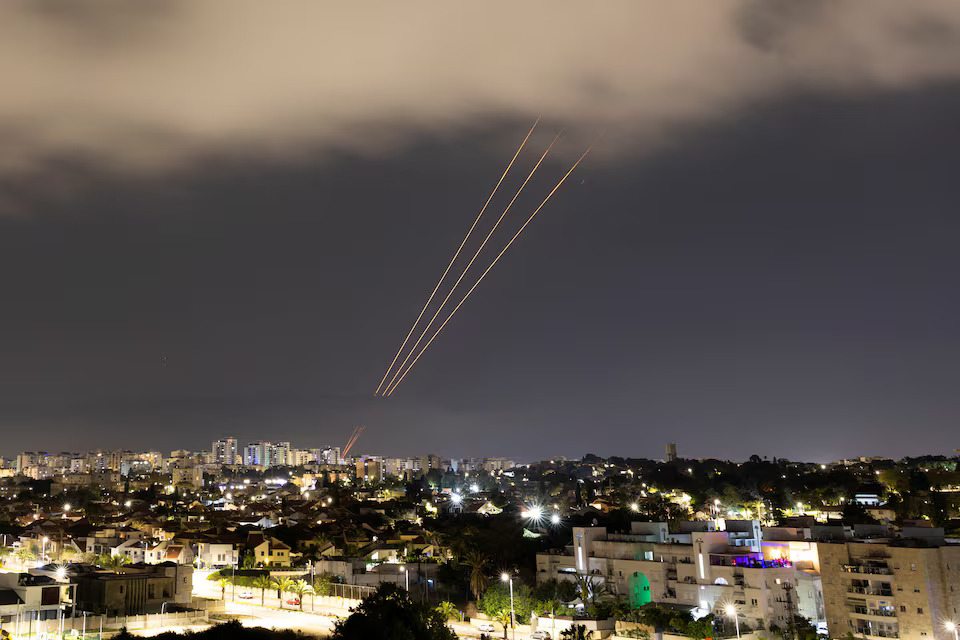Iran's senior military leaders described the drone and missile attack on Israel on April 14 night as “successful".
“The operation has been carried out more successfully than expected. The information on the missiles hitting the targets is not complete yet, but part of the impacts about which we have accurate, documented and ground reports illustrate that the operation has been accomplished with greater-than-expected success,” Islamic Revolutionary Guards Corps (IRGC) Commander Major General Hossein Salami said, referring to the “Operation True Promise” in retaliation to the Israeli airstrike on the consular section of the Iranian embassy in Damascus on April 1.
He also warned Israel that any reaction would trigger a harsher response from Iran, as they have already experienced the Islamic Republic’s capabilities.
Chief of Staff of the Iranian Armed Forces Major General Mohammad Hossein Baqeri said the retaliatory military strike on Israeli targets has ended and obtained desirable results, as all purposes of the operation were “fulfilled”.
He also warned Tel Aviv that any new offense against Iran would trigger Tehran’s next “more immense” operation.
“If Washington cooperates with the Zionist regime’s aggression or intends to step in with the facilities it has in the region, American bases and forces in the region will not be safe,” he added.
“A considerable number of drones and cruise and ballistic missiles have been used in this operation with well-thought-out tactics and proper planning, as neither the Iron Dome nor the Zionist regime’s missile defense shield could take any significant action against this operation. The operation’s purposes have been fulfilled,” the top commander said.
Meanwhile, Israeli army spokesman Rear Admiral Daniel Hagari on April 14 said that the vast majority of the missiles, suicide drones and cruise missiles were intercepted outside of Israel's borders, in a joint effort by Israel, the US, the UK and Jordan.
He said that Israeli and allied air defences shot down 99% of more than 300 drones and missiles fired by Iran overnight at Israel.
A 10-year-old girl suffered serious shrapnel injuries in southern Israel, where the Nevatim air-force base sustained “light damage to infrastructure” but remained operational, Hagari added.
The IRGC said in a statement that under a decree by Iran's Supreme National Security Council and the supervision of the General Staff of the Armed Forces, IRGC’s Aerospace Force launched tens of missiles and drones in retaliation to the Israeli airstrike on April 1 that killed seven IRGC members, including a senior commander of the IRGC's extra-territorial Quds Force, Brig Gen Mohammad Reza Zahedi.
In another statement, the IRGC warned the US government against support or involvement in any Israeli attacks on Iranian interests, saying that the US would face a "decisive" response, which would "make them regret". It also called on Washington to "rein in" Israel, or face the responsibility for its actions.
In response, US President Joe Biden said he would convene a meeting of leaders of the Group of Seven economies on April 14 to coordinate a diplomatic response to what he called Iran's brazen attack. In addition, US Defense Secretary Lloyd Austin said America did not seek conflict with Iran but would not hesitate to act to protect US forces and support the defense of Israel.
Palestinian Hamas said in a statement that the military operation by Iran was "a deserved response to the crime of targeting the Iranian consulate in Damascus and assassinating several Revolutionary Guard leaders there".
The Popular Front for the Liberation of Palestine also welcomed the Iranian attack on Israel, saying that "the legitimate Iranian response broke the prestige of the Zionist entity and exposed its fragility and inability to defend itself or restore its deterrent power".
Israel had been bracing for an Iranian response to the Damascus consulate strike since last week, when Iran's Supreme Leader Ayatollah Ali Khamenei said Israel "must be punished and shall be" for an operation he called equivalent to one on Iranian soil.
Iran's main ally in the region, the Lebanese Shi'ite group Hezbollah has been exchanging fire with Israel since the Gaza war began. The group said early on April 14 that it had fired rockets at an Israeli base.
On April 13, the IRGC seized an Israel-linked cargo ship in the Strait of Hormuz, one of the world's most important energy shipping routes, underscoring the risks to the world economy of a wider conflict.
Meanwhile, some flights across the region were diverted or suspended, and share prices fell in stock markets in Israel and Gulf states.







 Azerbaijan has been recognized as one of the safest countries in the world, ranking 90th among 163 countries on the Global Terrorism Index 2025 (GTI).
Azerbaijan has been recognized as one of the safest countries in the world, ranking 90th among 163 countries on the Global Terrorism Index 2025 (GTI).
 The Azerbaijani Defense Ministry has reported ongoing shelling of its army positions by Armenian forces since last week.
The Azerbaijani Defense Ministry has reported ongoing shelling of its army positions by Armenian forces since last week.
 Azerbaijanis around the world are commemorating March 31 as the Day of Genocide of Azerbaijanis, which took place 107 years ago and is considered o...
Azerbaijanis around the world are commemorating March 31 as the Day of Genocide of Azerbaijanis, which took place 107 years ago and is considered o...
 Azerbaijan’s historical biographical film “Taghiyev” has won the Best Feature Film award at the Dehancer Colorist Awards 2024. The film, which chro...
Azerbaijan’s historical biographical film “Taghiyev” has won the Best Feature Film award at the Dehancer Colorist Awards 2024. The film, which chro...



